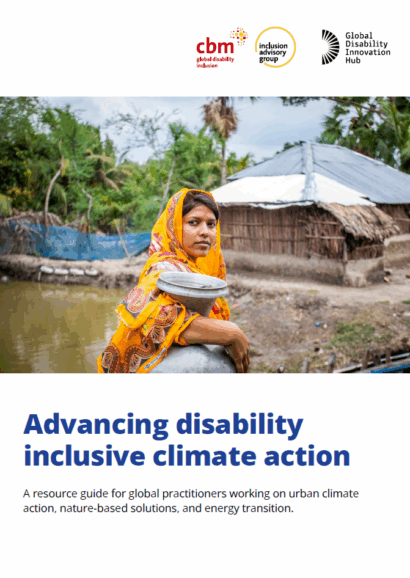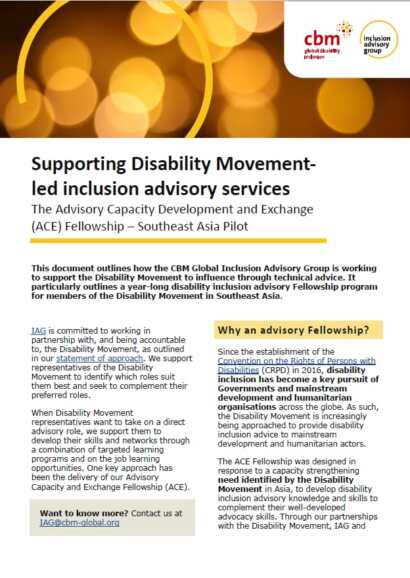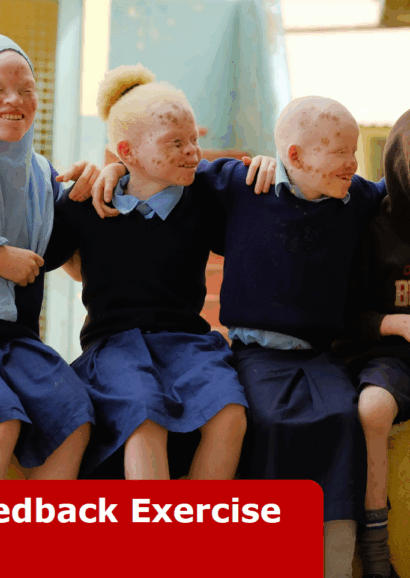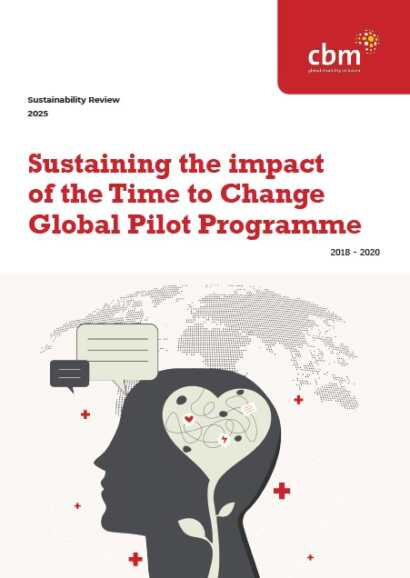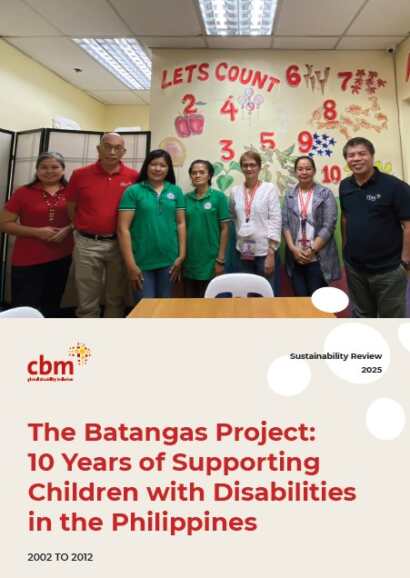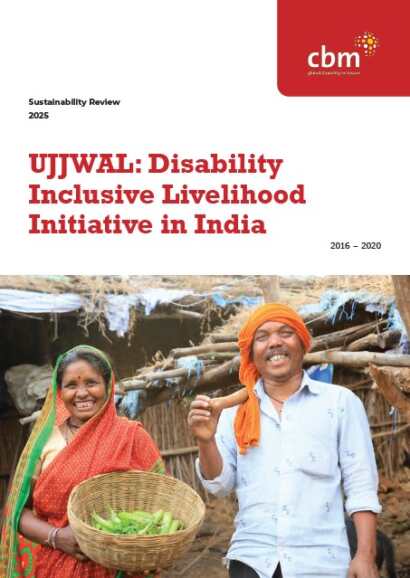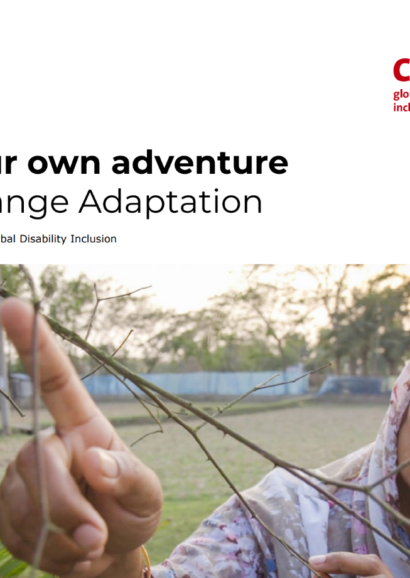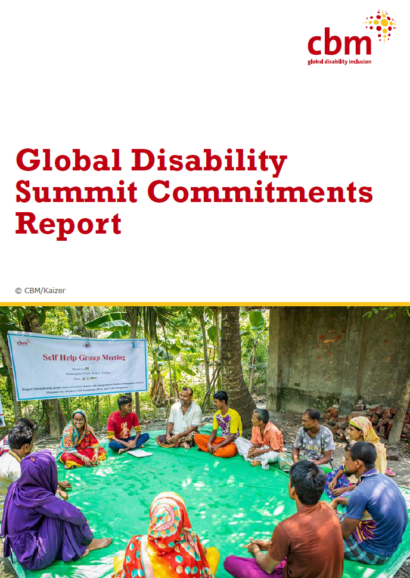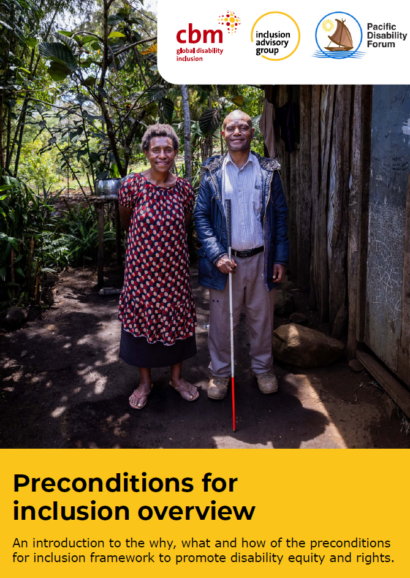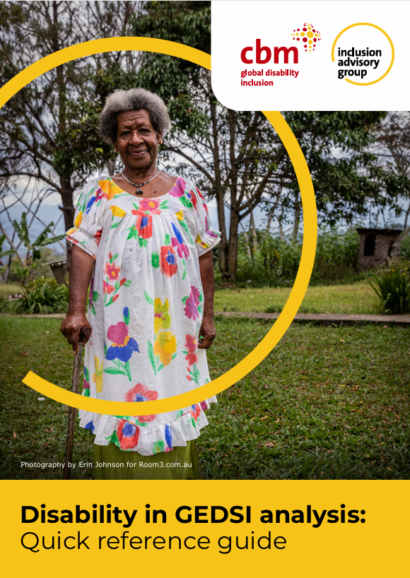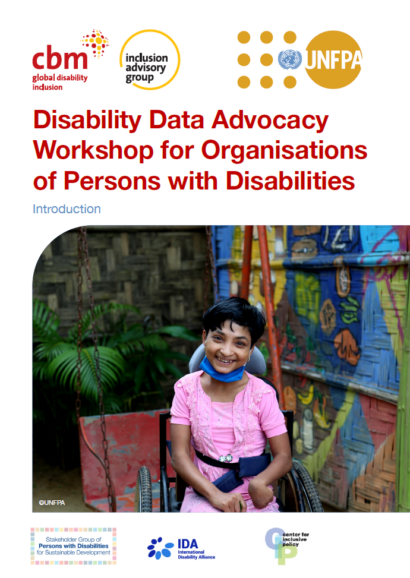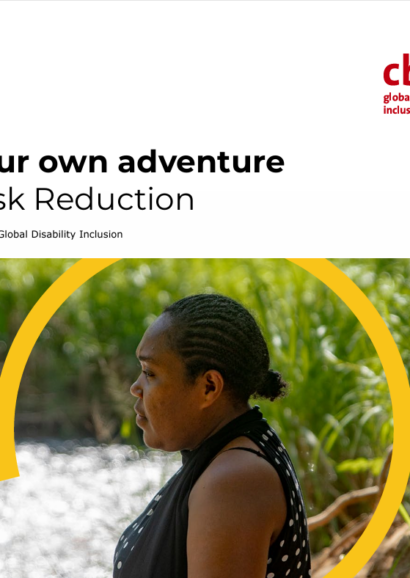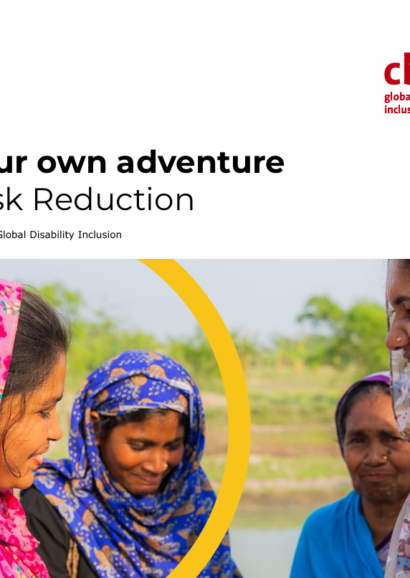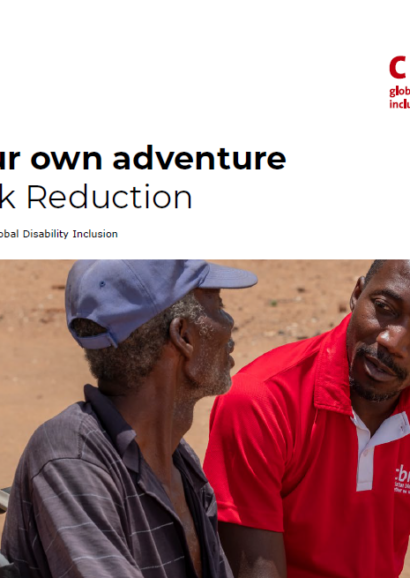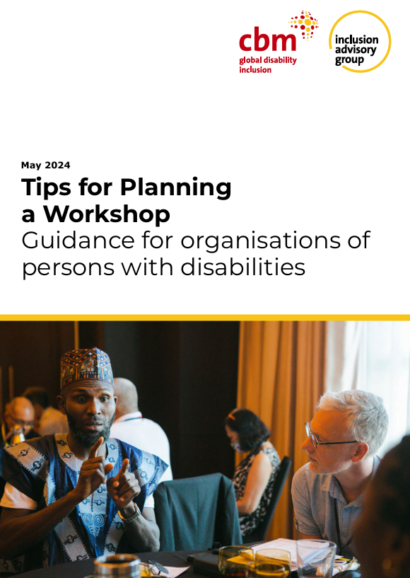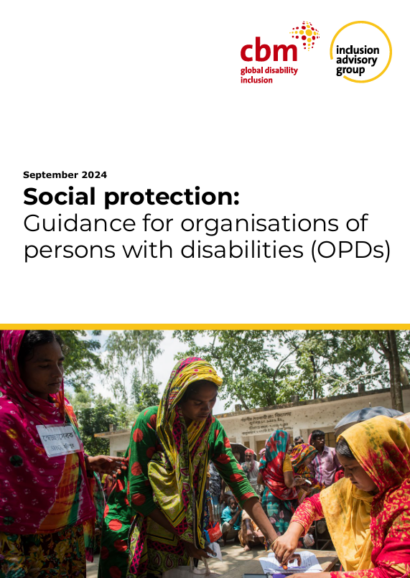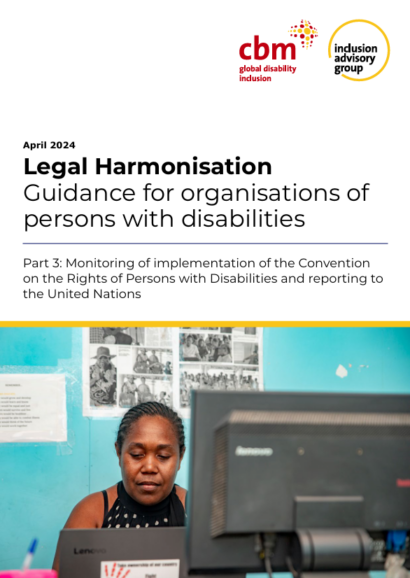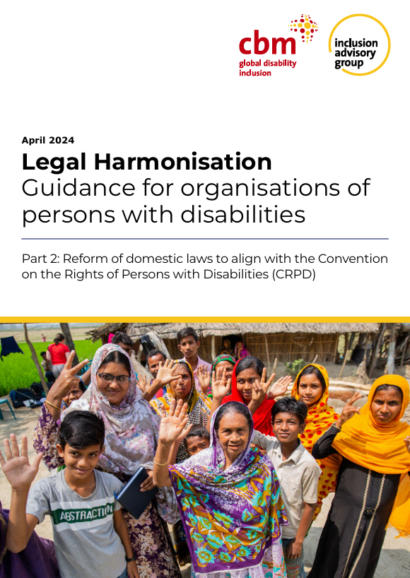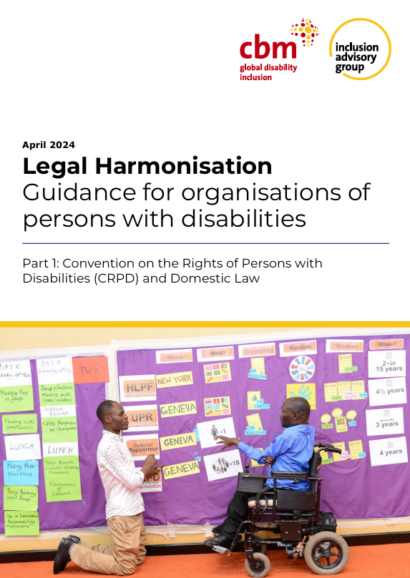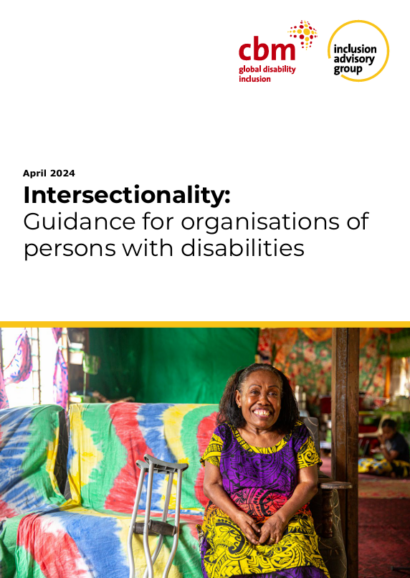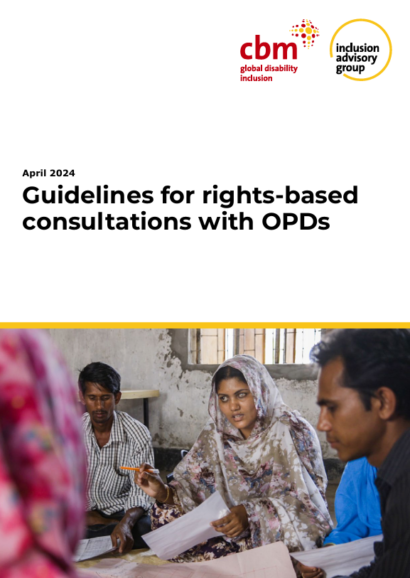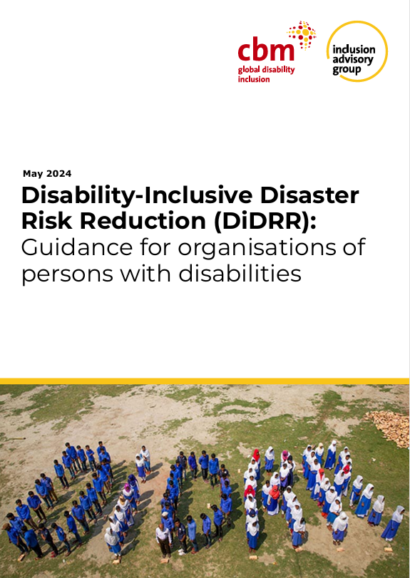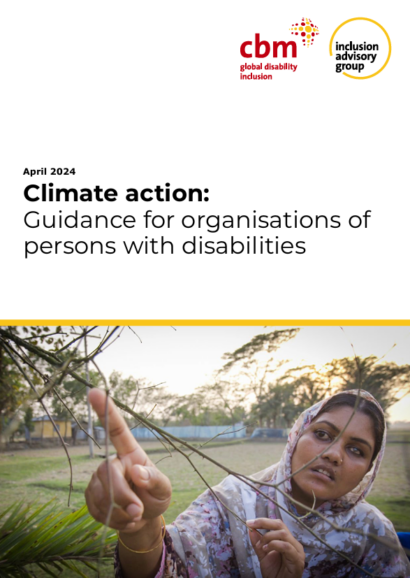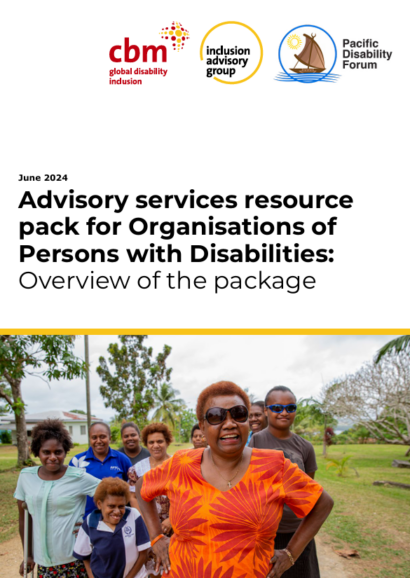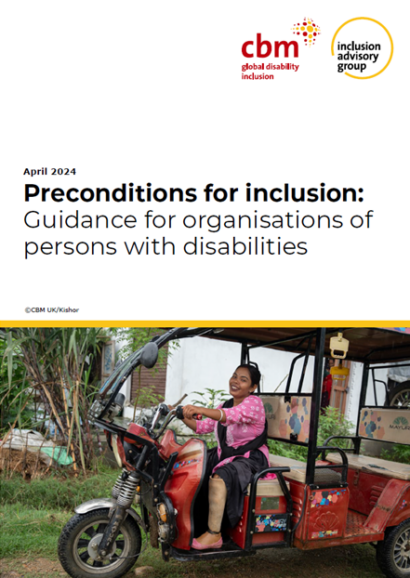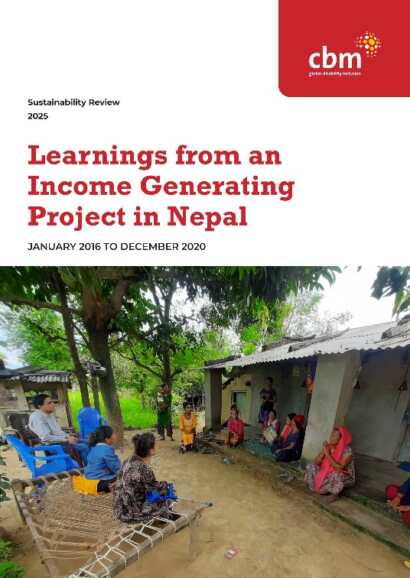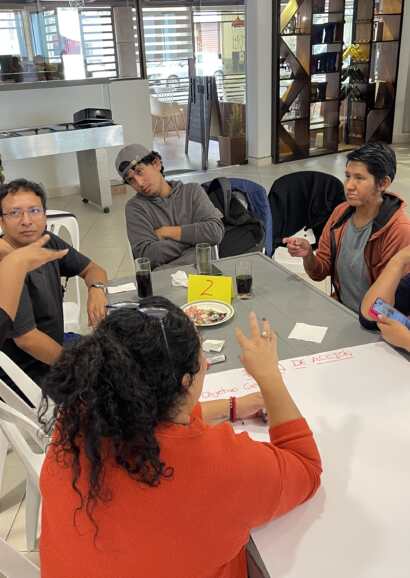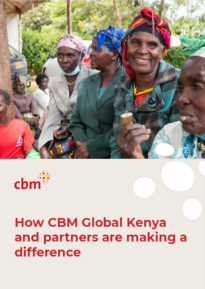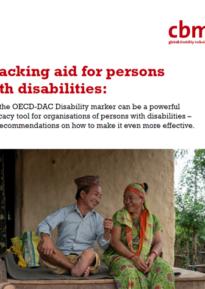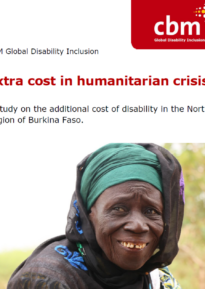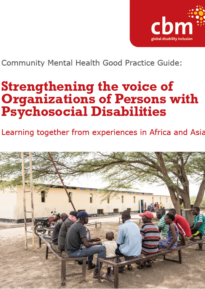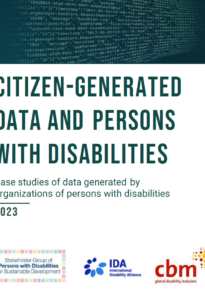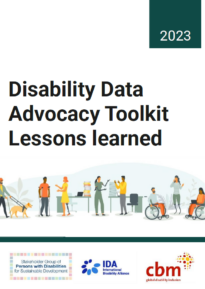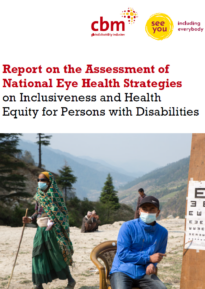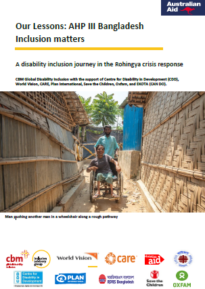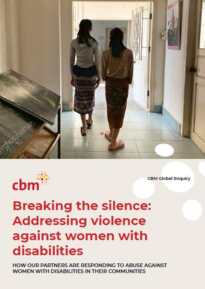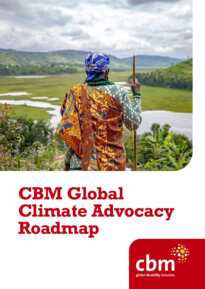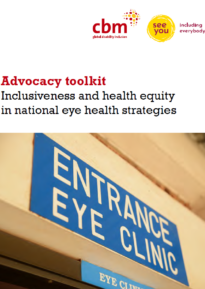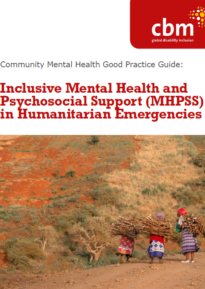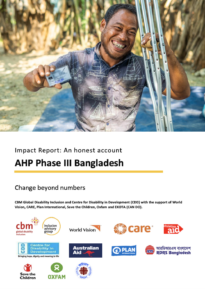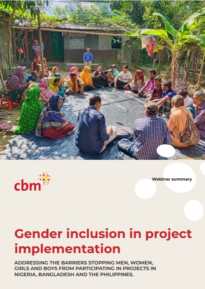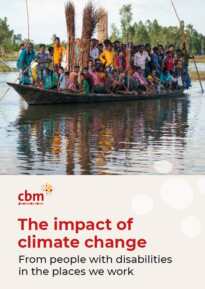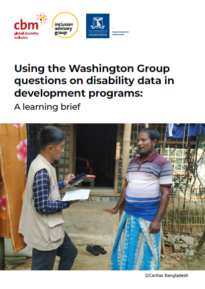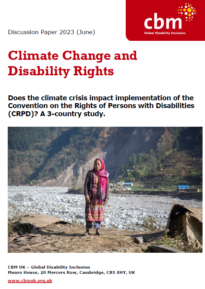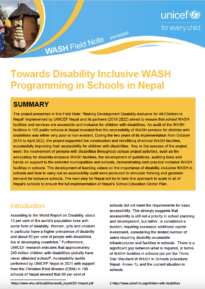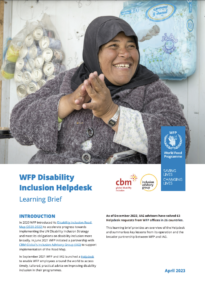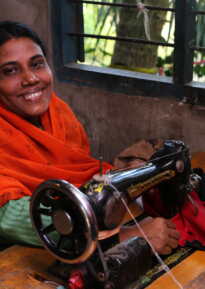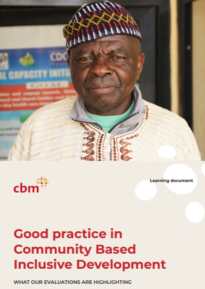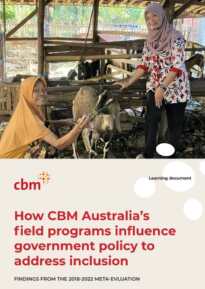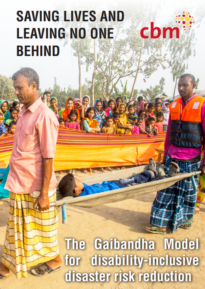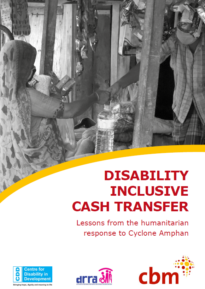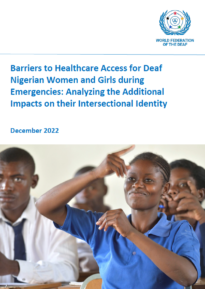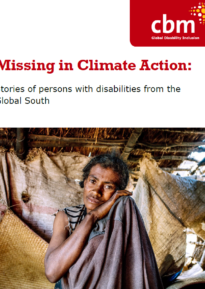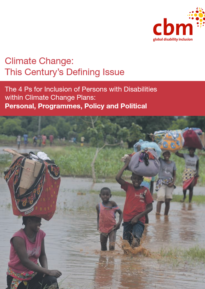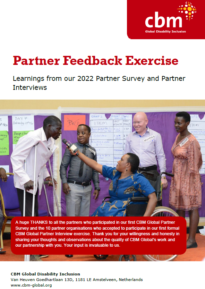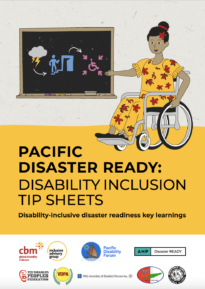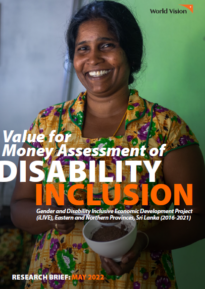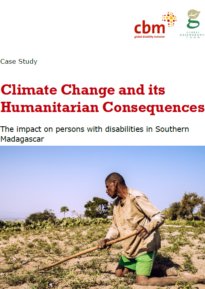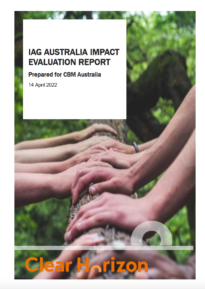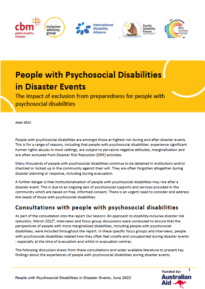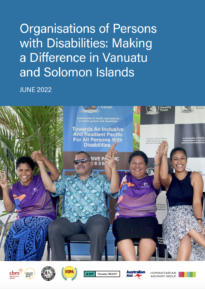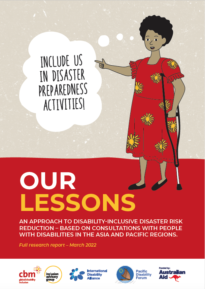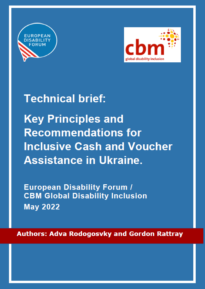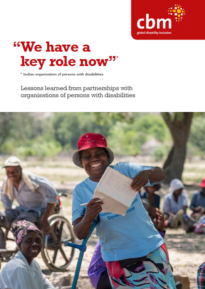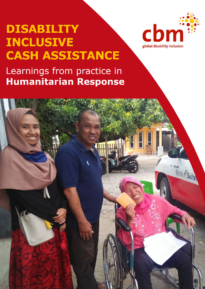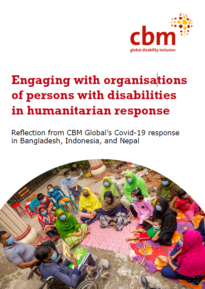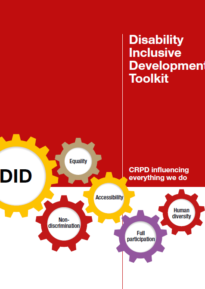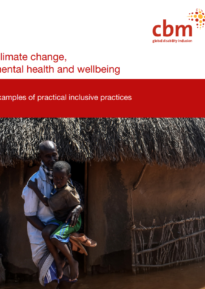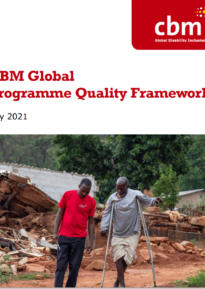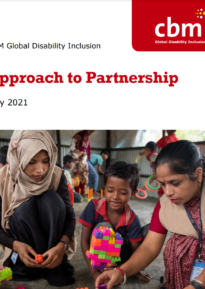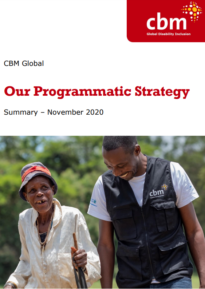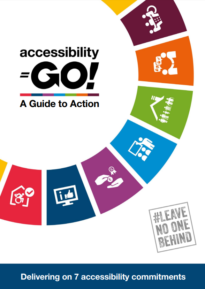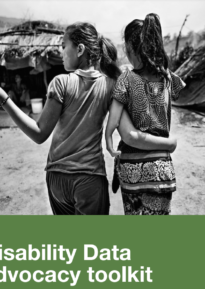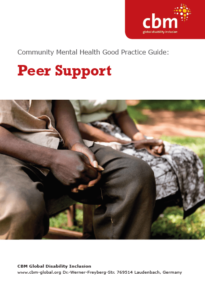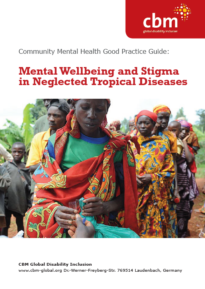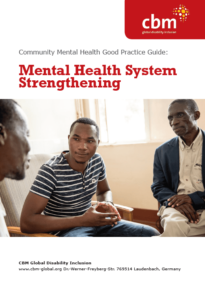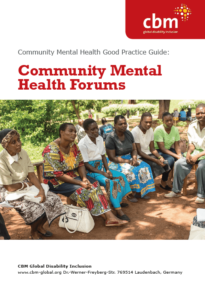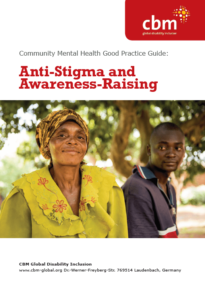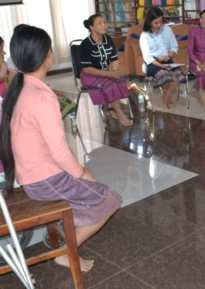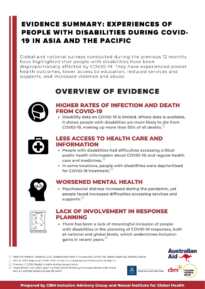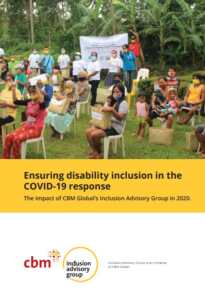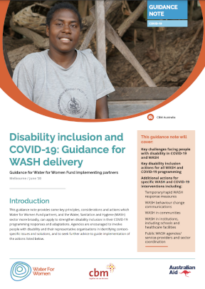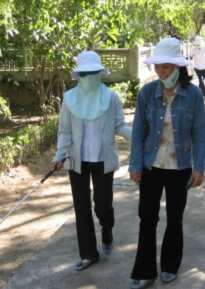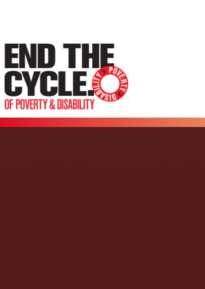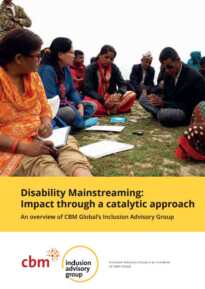Browse our resources to discover more about our approach, learning and the impact of our work.
Advancing disability inclusive climate action: A resource guide for global practitioners
The guide is designed for government officials, funders, technical experts, civil society organisations and development partners. It provides actionable entry points across the programme cycle—from strategy and design to procurement, budgeting, stakeholder engagement and monitoring. It also introduces a three-tiered framework for systematic action: safeguarding, inclusive approaches and targeted interventions.
Supporting Disability Movement-led inclusion advisory services
Support to the disability movement's capacity to engage in and influence through technical advice is a key request from our OPD partners, and accordingly a priority of IAG. In this short paper, we explain the rationale for this commitment, share some key learnings arising from the evaluation of our pilot Advisory Capacity and Exchange project, and share some ideas on "what's next".
2025 Partner Feedback Exercise Report
Interested to know what our partners have to say about us? Read our 2025 Partner Feedback Exercise report and check out our commitments.
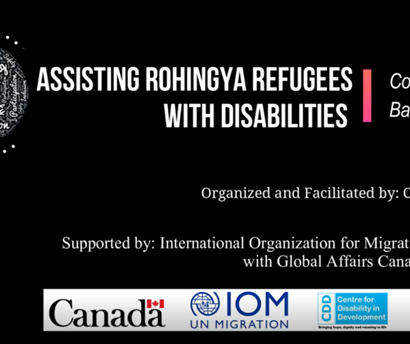 Read more on “Stepping outside the classroom”: Capacity Development with IOM Rohingya Response Staff
Read more on “Stepping outside the classroom”: Capacity Development with IOM Rohingya Response Staff
“Stepping outside the classroom”: Capacity Development with IOM Rohingya Response Staff
This video documents the process taken in developing the training curriculum, demonstrates the main training components and shares reflections of those involved including people with disabilities.
Sustaining the impact of the Time to Change Global Pilot Programme
This CBM Global Sustainability Enquiry report assesses the long-term impact of the Time to Change Global (TTCG) Pilot Programme (2018–2020), which aimed to reduce mental health stigma across five countries. Focusing on Kenya and Nigeria, it explores how key elements—such as peer support, storytelling by Mental Health Champions, and the use of TTCG methods—have endured beyond the project’s end. The report highlights enablers like training and mentorship, while also identifying ongoing challenges related to funding and scale.
The Batangas Project: 10 Years of Supporting Children with Disabilities in the Philippines
CBM supported the Batangas Project, a Community-Based Rehabilitation project in the Philippines, from 2002 to 2012. Over a decade later, a return visit reveals lasting impact through stronger government disability inclusion and empowered parent-led advocacy via AKAPIN.
UJJWAL: Disability Inclusive Livelihood Initiative in India
This document is part of the CBM Global Sustainability Enquiry series and provides an in-depth review of the UJJWAL project, a disability-inclusive livelihood initiative implemented in Madhya Pradesh, India, from 2016 to 2020. Funded by CBM UK and supported by CBM India in partnership with local NGO, Naman Sewa Samiti, the project aimed to enhance the incomes and livelihoods of people with disabilities and their families through sustainable organic farming practices. This report examines what the project achieved at different operational levels (individual, organisational, and Governmental), and the factors that have contributed to or undermined the sustainability of these achievements.
Choose your own adventure Climate Change Adaptation
An interactive game to encourage participants to think about opportunities for DI, and the potential consequences of missing DI opportunities, across the project cycle, for CCA-specific projects. CYOA games are interactive activities designed to encourage participants to think about opportunities for DI, and the potential consequences of missing DI opportunities, across the project cycle. Participants are presented with a series of scenarios and options for decision-making. As they go through the game, they choose an approach to take at each stage and are presented with the outcomes of their decisions. Participants should be encouraged to work through the game several times, making different decisions, to see the end impacts on disability inclusion success.
Global Disability Summit (GDSCommitments Report
In this report, we reflect on progress towards our 2022 GDS commitments. We also highlight the new commitments we have submitted for 2025 which will build on all of the progress achieved and which further clarify our ambition going forward.
Preconditions for inclusion overview
The preconditions for inclusion are essential elements that must be established to create an enabling environment for people with disabilities.
Disability in GEDSI analysis: Quick reference guide
This quick reference guide is for Gender Equality, Disability and Social Inclusion (GEDSI) advisors and development practitioners who are undertaking GEDSI analysis and looking to ensure that disability equity and rights are adequately addressed.
Disability Data Advocacy Workshop for OPDs
These workshop materials were developed with the support of UNFPA Asia and the Pacific, in collaboration with the Stakeholder Group of Persons with Disabilities, the International Disability Alliance, the Centre for Inclusive Policy and national and regional organizations of persons with disabilities, including the ASEAN Disability Forum and Pacific Disability Forum. Drawing in part on the Disability Data Advocacy Toolkit, workshop materials have been developed to introduce the basic concepts and skills on disability data to OPDs and their members and to support applying these in the local context.
Choose your own adventure Disaster Risk Reduction (Pacific)
CYOA games are interactive activities designed to encourage participants to think about opportunities for DI, and the potential consequences of missing DI opportunities, across the project cycle. Participants are presented with a series of scenarios and options for decision-making. As they go through the game, they choose an approach to take at each stage and are presented with the outcomes of their decisions. Participants should be encouraged to work through the game several times, making different decisions, to see the end impacts on disability inclusion success. An interactive game to encourage participants to think about opportunities for DI, and the potential consequences of missing DI opportunities, across the project cycle, for DRR-specific projects.
Choose your own adventure Disaster Risk Reduction (Asia)
CYOA games are interactive activities designed to encourage participants to think about opportunities for DI, and the potential consequences of missing DI opportunities, across the project cycle. Participants are presented with a series of scenarios and options for decision-making. As they go through the game, they choose an approach to take at each stage and are presented with the outcomes of their decisions. Participants should be encouraged to work through the game several times, making different decisions, to see the end impacts on disability inclusion success. An interactive game to encourage participants to think about opportunities for DI, and the potential consequences of missing DI opportunities, across the project cycle, for DRR-specific projects.
Choose your own adventure Disaster Risk Reduction (Africa)
CYOA games are interactive activities designed to encourage participants to think about opportunities for DI, and the potential consequences of missing DI opportunities, across the project cycle. Participants are presented with a series of scenarios and options for decision-making. As they go through the game, they choose an approach to take at each stage and are presented with the outcomes of their decisions. Participants should be encouraged to work through the game several times, making different decisions, to see the end impacts on disability inclusion success. An interactive game to encourage participants to think about opportunities for DI, and the potential consequences of missing DI opportunities, across the project cycle, for DRR-specific projects.
Tips for Planning a Workshop Guidance for organisations of persons with disabilities
This guidance note addresses some common questions that OPDs ask about facilitating an advisory workshop. It includes guidance on planning and design, implementation, inclusive facilitation, and feedback mechanisms and provides some tools and templates for OPDs to adapt and use.
Social protection: Guidance for organisations of persons with disabilities (OPDs)
This guidance note describes the key issues on disability inclusive social protection and suggests how OPDs can take action to ensure they are understood and actioned by development and humanitarian actors.
Legal Harmonisation Guidance for organisations of persons with disabilities Part 3
This set of three guidance notes has been designed to clarify the relationship between the Convention on the Rights of Persons with Disabilities (CRPD), and domestic laws. Part 1 is about the CRPD and domestic law; Part 2 relates to law reforms to align with CRPD; and Part 3 relates to monitoring and reporting under CRPD.
Legal Harmonisation Guidance for organisations of persons with disabilities Part 2
This set of three guidance notes has been designed to clarify the relationship between the Convention on the Rights of Persons with Disabilities (CRPD), and domestic laws. Part 1 is about the CRPD and domestic law; Part 2 relates to law reforms to align with CRPD; and Part 3 relates to monitoring and reporting under CRPD.
Legal Harmonisation Guidance for organisations of persons with disabilities Part 1
This set of three guidance notes has been designed to clarify the relationship between the Convention on the Rights of Persons with Disabilities (CRPD), and domestic laws. Part 1 is about the CRPD and domestic law; Part 2 relates to law reforms to align with CRPD; and Part 3 relates to monitoring and reporting under CRPD.
Intersectionality: Guidance for organisations of persons with disabilities
This guidance note details the key considerations related to how disability and other identities can combine to create unique experiences of exclusion. It suggests action points for OPDs to ensure that intersectionality is understood considered by development and humanitarian actors, so that groups of people at higher risk of exclusion are not left behind in policy and programming.
Guidelines for rights-based consultations with OPDs
This guidance note has been produced for OPDs to use with development and humanitarian organisations who may wish to consult with them on disability inclusion. It details key considerations for partners and clients to ensure they achieve effective and meaningful OPD engagement.
Disability-Inclusive Disaster Risk Reduction (DiDRR): Guidance for OPDs
This guidance note describes the key issues on disability inclusive DRR and suggests how OPDs can take action to ensure they are understood and addressed by development and humanitarian actors.
Climate action: Guidance for organisations of persons with disabilities
This guidance note describes the key issues on disability inclusive CCA and suggests how OPDs can take action to ensure they are understood and addressed by development and humanitarian actors.
Advisory services resource pack for Organisations of Persons with Disabilities
This set of eight resources has been developed to support OPDs engaging in advisory work. The suggestions and tools can be applied and adapted to suit different countries and contexts, and can be complemented by coaching, mentoring, peer exchange and opportunities to learn from experience.
Preconditions for inclusion: Guidance for organisations of persons with disabilities
This guidance note describes the key components of four key preconditions to inclusion, and how OPDs can take action to ensure they are understood and addressed by development and humanitarian actors.
Sustainability Enquiry – Nepal
From 2016 to 2020, CBM Nepal's Saksham Mahila project empowered people with disabilities, especially women, by enhancing their socio-economic status and access to inclusive services. However, three years on, most Self-Help Groups have struggled to remain active, the single cooperative established is no longer operational, and while disability inclusive services improved, sustaining progress has been challenging for local governments. In contrast, all nine small business owners interviewed have maintained their businesses. This report examines the long-term sustainability of the project’s outcomes, identifying key elements that have contributed to or undermined its lasting impact, and forms part of CBM Global’s broader Sustainability Enquiry.
Pilot Study of Deaf Indigenous Bolivian Women’s Health Experiences
This is a pilot project focusing on community-based formative research to identify salient issues and factors relating to deaf indigenous women in Bolivia’s retrospective and current health experiences. In collaboration with the Bolivian Federation of the Deaf (FEBOS), under the management and supervision of the World Federation of the Deaf (WFD) and with the financial support of the CBM Global Disability Inclusion (CBMG) and the University of Rochester, this research will help better understand future research directions related to lifespan health outcomes and disparities of the deaf women community in Bolivia.
CBM Global Kenya Impact Report
CBM Global Kenya works across the country to support people with or at risk of Disability. They work closely with the African Inland Church Health Ministries (AICHM) and the Diocese of Meru - Service for the Poor in Adaptive Rehabilitation Kinship (DOM-SPARK). This report shares stories and reflections from those working on the Meru Inclusive Trachoma Wash-Plus (MINT) project and the OPD LEAD project.
Tracking aid for persons with disabilities
Why the OECD-DAC Disability marker can be a powerful advocacy tool for organisations of persons with disabilities – and recommendations on how to make it even more effective.
Evidence summary: Disability Data and Eye Health
In 2023, The Fred Hollows Foundation (The Foundation) engaged CBM Global's Inclusion Advisory Group (IAG) to gather evidence and provide practical recommendations on collecting and using disability data within eye health programs. Although there were well-established tools and guidance on disability data within population surveys and development programs, clear guidance on their application and rollout in the eye health sector was unavailable.
Extra cost in humanitarian crisis
This study was conducted CBM Global, FEBAH and Solidev in April 2022 in Ouahigouya commune against a backdrop of an increasing humanitarian crisis in the north of Burkina Faso. It aims to quantify the additional costs incurred by households with members with disabilities among the IDP population. It provides empirical data to inform the humanitarian programs of CBM Global and the humanitarian response to the IDP crisis in general to ensure it addresses the specific needs and additional cost faces by persons with disabilities, thereby contributing to more equitable assistance programs.
Strengthening the voice of Organizations of Persons with Psychosocial Disabilities
Organizations of Persons with Disabilities (OPDs) can play an important role as intermediary bodies between policymakers and persons with disabilities. Strengthening these representative organisations can help achieve these aims and broader access to the enjoyment of fundamental human rights and freedoms on an equal basis with others.
Citizen-generated Data & Persons with Disabilities
Case studies of data generated by organizations of persons with disabilities: This report features noteworthy examples of projects and initiatives that have successfully gathered data on persons with disabilities and aims to empower advocates and other organizations of persons with disabilities to develop their own regional, national, or international projects to collect data for advocacy purposes. The International Disability Alliance, the Stakeholder Group of Persons with Disabilities, and CBM Global Disability Inclusion carried out a survey with organizations of persons with disabilities (OPD) and other stakeholders to assess the use and gaps of our Disability Data Advocacy Toolkit. The survey further explored data gaps and gathered OPD-led citizen-generated data. Two reports emerged from this work: (1) Disability Data Advocacy Toolkit: lessons learned and (2) a compilation of case studies of data generated by organizations of persons with disabilities.
Disability Data Advocacy Toolkit Lessons Learned
A survey was developed and shared with organizations of persons with disabilities to understand how the Disability Data Advocacy Toolkit is being used and how it can be improved as an advocacy resource for organizations of persons with disabilities. The survey was made accessible in multiple languages including Arabic, English, French, Portuguese, Spanish, and a version in International Sign. This report provides the results of this survey and intends to demonstrate the needs of organizations of persons with disabilities in relation to data and their use for advocacy in disability rights. The International Disability Alliance, the Stakeholder Group of Persons with Disabilities, and CBM Global Disability Inclusion carried out a survey with organizations of persons with disabilities (OPD) and other stakeholders to assess the use and gaps of our Disability Data Advocacy Toolkit. The survey further explored data gaps and gathered OPD-led citizen-generated data. Two reports emerged from this work: (1) Disability Data Advocacy Toolkit: lessons learned and (2) a compilation of case studies of data generated by organizations of persons with disabilities.
Report on the Assessment of National Eye Health Strategies
How well do national eye health strategies address inclusiveness and health equity in eye health? CBM Global and SeeYou Foundation are proud to share a report on an assessment of national eye health strategic plans on health equity and inclusion. Using the recommendations from the World Health Organization’s Global report on health equity for persons with disabilities, we assessed the current state of national eye health plans to get a baseline of how well disability inclusion is addressed at the national level. This report is to set a baseline to see where countries in the development of their next plan can improve.
AHP III Bangladesh: A disability inclusion journey in the Rohingya crisis
This report documents achievements and lessons learned and presents recommendations to progress disability inclusion further in the Rohingya response and for the humanitarian sector at large.
Breaking the silence: Addressing violence against women with disabilities
This document explores how CBM Global implementing partners, including OPDs, are responding to issues of gender-based violence in the communities in which they work, including what is working well and where more support is needed.
CBM Global Climate Advocacy Roadmap
The purpose of the roadmap is to set out our intended direction of travel for climate advocacy (2023 - 2026). Our hope is that international, regional and national level climate policies will fully reflect the inclusion of persons with disabilities.
Advocacy toolkit: Inclusiveness and health equity in national eye health strategies
This toolkit assists CBM Global country teams and partners, including Organisation of Persons with Disabilities (OPD) partners and other eye care Non-governmental Organisations (NGOs), in advocating for more inclusive eye health.
Community Mental Health Good Practice Guide: Inclusive MHPSS in Humanitarian Emergencies
This document provides guidance on inclusive MHPSS programming in humanitarian emergencies. It is designed to highlight essential frameworks and principles, and the need for robust and sustainable MHPSS programming, rather than to provide detailed MHPSS technical guidance.
AHP Phase III Bangladesh Impact Report: An honest account
A new report seeking to reflect the lived experience of people with disabilities in the Rohingya AHP Phase III Response, their stories and feedback on what has changed for them, and the continued barriers they face.
Gender inclusion in project implementation
CBM Australia recently held a webinar with our partners in Bangladesh, Nigeria and the Philippines looking at what has stopped men, women, girls, and boys from participating in project activities, and what they have done to address this. These are a few highlights from what we learned.
The impact of climate change: From people with disabilities in the places we work
This document captures the perspectives of people with disabilities who have been affected by climate change in the countries we work, and documents how CBM Global is responding.
A learning brief on disability data using Washington Group questions
The learning brief offers practical guidance with suggested approaches to overcoming common issues and concerns, with a focus on the Washington Group questions.
Climate Change and Disability Rights
In commissioning the study “Climate action and its impact on the implementation of the United Nations Convention on the Rights of Persons with Disabilities (CRPD)” we hypothesised that the costs and damages incurred by climate change, if not met with additional and specific funding, will result in national funds being diverted away from essential government services.
Towards Disability Inclusive WASH Programming in Schools in Nepal
CBM Global’s Inclusion Advisory Group worked with UNICEF Nepal on a project to ensure that school WASH facilities and services were accessible and inclusive for children with disabilities.
WFP Disability Inclusion Helpdesk: Learning Brief
This learning brief provides an overview of the Helpdesk and summarises key lessons from its operation and the broader partnership between WFP and IAG.
What recent evaluations are telling us about our work in livelihoods
Recently, CBM Australia looked at evaluations of our Community Based Inclusive Development (CBID) work over the last five years. This document highlights key learnings about livelihoods support which can be used to help inform and improve project planning and monitoring and evaluation.
Good Practice in CBID
CBM Australia recently conducted a meta-evaluation which looked at 33 evaluations from our international projects over four years. This document details what we learnt around good practice when working with people with disabilities in community based inclusive development (CBID) programs.
How CBM Australia’s field programs influence government policy to address inclusion
Drawing on findings from our recent meta-evaluation, this document highlights how CBM Australia’s field projects influence government policy or action. Local policy influence was found to be the most common type of change, followed by national and institutional policy influence.
Saving Lives & Leaving No one Behind
The purpose of this documentation of good practice is to help CBM Member Associations, Country Offices, Advisors and Partners in disaster-prone countries to develop and implement high-quality disaster risk reduction (DRR) programs which are integrated into larger community-based inclusive development work.
Disability Inclusive Cash Transfer: Lessons from the humanitarian response to Cyclone Amphan
This learning document highlights good practices and lessons from this response and is intended to provide guidance to NGOs, state actors and OPDs to create inclusive responses and deliver equal outcomes through inclusive Multipurpose Cash Assistance (MPCA) in humanitarian action.
Barriers to Healthcare Access for Deaf Nigerian Women and Girls during Emergencies
This report presents preliminary research on the experiences faced in health care by deaf women and girls in Nigeria, highlighting the most recent emergency and disaster situation, the COVID-19 pandemic. The report will present several recommendations to reduce the inequities in the intersection of gender, disability, and linguistic minorities.
Missing in Climate Action
This publication tells the story of the people, the individuals and communities affected by climate change, yet absent from key conversations and actions on climate.
Climate Change: This Century’s Defining Issue
The 4 Ps for Inclusion of Persons with Disabilities within Climate Change Plans: Personal, Programmes, Policy and Political
Partner Feedback Exercise 2022
Learnings from our 2022 Partner Survey and Partner Interviews
Pacific Disaster Ready: Disability inclusion tip sheets
The Pacific Disaster Ready Tip Sheets are a suite of documents and includes key messages and talking points for different sectoral and thematic issues drawing on the learnings from the past four and a half years of the Pacific Disaster Ready project.
Value for Money Assessment of Disability Inclusion
Our Inclusion Advisory Group worked with World Vision in Sri Lanka, and their research shows the value of investing in disability inclusion.
Case Study: Climate Change and its Humanitarian Consequences
The impact of the climate crisis in Madagascar, the ongoing food crisis, and the challenges faced by persons with disabilities and their representative organisations in accessing humanitarian assistance.
Case study: Nepal’s changing climate
The impact of climate induced disasters on people living in poverty who have much less adaptative capacity to respond to the negative and sometimes devastating impact of climate change.
Inclusion Advisory Group: Impact Report
An independent evaluation of the work of Australia’s Inclusion Advisory Group shows that the team effectively supports governments, multilaterals and NGOs to better address disability inclusion in their programs.
People with Psychosocial Disabilities in Disaster Events
A report on the impact of exclusion of people with psychosocial disabilities from disaster preparedness.
Organisations of Persons with Disabilities: Making a Difference in Vanuatu and Solomon Islands
A report exploring the roles and impact of OPDs in Vanuatu and Solomon Islands and identifying key challenges and enablers constraining and supporting OPDs’ contributions to the disaster preparedness and response sector.
Our Lessons: disability-inclusive disaster risk reduction report
An approach to disability-inclusive disaster risk reduction based on consultations with people with disabilities in the Asia and Pacific regions.
Key Principles & Recommendations for Inclusive Cash & Voucher Assistance in Ukraine
This technical brief is intended to provide general guidance for humanitarian agencies operating in Ukraine on how to implement Disability Inclusive Cash and Voucher Assistance (CVA). It aims to ensure that disability is mainstreamed within the CVA intervention and in line with the UN Convention on the Rights of Persons with Disabilities (CRPD), International Humanitarian Law and the Humanitarian Principles.
“We have a key role now” Lessons learned from partnerships with OPDs
In order to gather feedback on its partnerships with organisations of persons with disabilities CBM Global conducted a listening exercise through 2020 and 2021. The listening exercise celebrates what is working well and identifies areas for improvement. It is offered as an example of what partnership can mean and as a contribution to the wider efforts of integrating organisations of persons with disabilities into international cooperation.
Disability Inclusive Cash Assistance: Learnings from practice in Humanitarian Response
This case study collection describes lessons learned from seven inclusive humanitarian cash transfer projects implemented from 2015 – 2020, and five ongoing projects from the 2020 Covid-19 pandemic responses. The projects employed cash transfer in a range of humanitarian crises; using unrestricted cash transfers distributed via different cash delivery mechanisms. Annex 1 provides an overview of the analysed responses and the project briefs of seven of the case studies. The collection aims to benefit both humanitarian practitioners engaged in CBI and the wider humanitarian sector by presenting insights and learning on how humanitarian CBI programs can be made more inclusive, to ensure equal outcomes for disaster-affected people with disabilities and other at-risk groups.
Engaging with organisations of persons with disabilities in humanitarian response
Reflection from CBM Global’s Covid-19 response in Bangladesh, Indonesia, and Nepal
Disability Inclusive Development Toolkit
This toolkit is designed as a resource for CBM that can be used in a variety of ways: to support staff induction, team meetings, refresher days and training workshops. It can also be used as a tool for personal reflection and self-study. Tips for those intending to use it as a training resource are shaded differently. The toolkit is presented in four main chapters targeting different audiences. Chapter 1: DID an introduction Chapter 2: DID for managers Chapter 3: DID for programme staff Chapter 4: Inclusive training and facilitation
Climate change, mental health and wellbeing
The negative impacts on mental health and wellbeing of climate change.
CBM Global Programme Quality Framework
The purpose of the Programme Quality Framework is to set out the high-level principles and commitments that we expect to guide programme quality and to which we seek to be held accountable. The overall aim is to ensure that those who we serve and assist through our programming and the donors who support these programmes, can have trust in the quality, effectiveness, efficiency, relevance, sustainability and impact of the work that we undertake.
CBM Global’s Approach to Partnership
This is a summary of CBM Global’s approach and commitment to Partnership. It outlines our Partnership Principles and the relationship we have with our partners. In all our work we want to be guided by and held accountable to these principles.
CBM Global’s Programmatic Strategy
CBM Global’s programmatic strategy is driven by 5 stark facts.
AccessibilityGo: A Guide to Action
Accessibility GO! A Guide to Action aims to provide practical support on how to deliver a whole-of-organisation approach towards accessibility. It describes how to progressively achieve 7 core accessibility commitments across built environments, information and communications, procurement of goods and services, training and capacity development, programmes, meetings and events, recruitment and human resource (HR) management.
Disability Data Advocacy Toolkit
The aim of this toolkit is to contribute to the growing global dialogue on the importance of data on people with disabilities, specifically to provide some basic knowledge on data collection, analysis and use of data for evidence-based advocacy.
Community Mental Health Good Practice Guide: Peer Support
Practical examples of how different types of peer support programs can be delivered, drawing on CBM Global’s experiences around the world.
Community Mental Health Good Practice Guide: Mental Wellbeing & Stigma in NTDs
Practical examples of how CBM Global is working with partners to mainstream mental health in Neglected Tropical Diseases (NTDs) programs, to reduce stigma improve mental wellbeing.
Community Mental Health Good Practice Guide: Mental Health System Strengthening
Strengthening mental health systems is a focus of our work. Practical examples of how initiatives, such as the World Health Organisation’s (WHO) health system building blocks, can be used to strengthen mental health systems, drawing on CBM Global’s experience in West and Central Africa.
Community Mental Health Good Practice Guide: Community Mental Health Forums
Practical examples of how CBM Global is supporting Community Mental Health Forums, including good practice recommendations and lessons learned.
Community Mental Health Good Practice Guide: Anti-Stigma and Awareness-Raising
Practical examples of how anti-stigma, anti-discrimination and awareness raising work can improve the mental wellbeing of people with disabilities, drawing on CBM Global’s own experience.
Accessible meetings and events: a toolkit
Guidance on organising accessible and inclusive events and meetings in planning, delivery and follow-up stages.
Evidence Summary: Experiences of People with Disabilities During COVID-19 in Asia and the Pacific
Global and national surveys have highlighted that people with disabilities have been disproportionally affected by COVID-19.
Inclusion Advisory Group: Impact Report 2020
This overview showcases the work of our Inclusion Advisory Group in 2020.
Disability inclusion and COVID-19: Guidance for WASH delivery
This guidance note from our Inclusion Advisory Group provides some key principles, considerations and actions.
Organisational Engagement on Disability Inclusion tool
This tool was developed with ANCP Partner Organisations to support development organisations to capture a ‘snap shot’ of how they are engaging with disability inclusion, to assess what areas need further work, and to assist action planning.
End the Cycle
Provides free and downloadable videos, factsheets and toolkits in which people with disability tell their own stories.
CBM Disability & Gender Toolkit
How organisations can assess their context and their approaches.
Disability Mainstreaming: Impact through a catalytic approach
This report gives an overview of the work of our Inclusion Advisory Group Australian team from 2014 to 2019.

